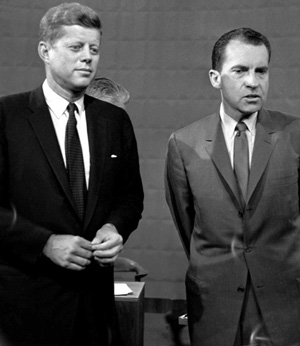The debate. Candidates’ final chance to make pitches. The make-or-break moment to revive campaigns. A bad performance that loses the election. Debates are an important part of our American democracy. We watch platforms and visions unfold and decide who might be best at executing them. They help us choose who is the right candidate for the job. But is that still true?
Most of us are familiar with the famous Nixon-Kennedy debate on September 29th, 1960. The first televised general election debate, it played a key role in Senator Kennedy’s narrow victory that November. While radio listeners overwhelmingly thought Vice President Nixon had won, those who watched on television saw a pale and underweight VP recovering from surgery versus a calm and confident Kennedy. That played very well for the previously obscure Massachusetts senator. Many say he won the election that night. From then onward, debates became an integral facet of the American electoral process.
In subsequent presidential contests, the non-partisan League of Women Voters conducted the debates. By 1988, however, the League decided it would pull out of sponsoring them altogether, saying the campaigns had negotiated “behind closed doors” to control who attended and what happened at each debate. At the time, the League released a pointed statement saying “it has become clear… the candidates’ organizations aim to add debates to their list of campaign-trail charades devoid of substance, spontaneity and answers to tough questions. The League has no intention of becoming an accessory to the hoodwinking of the American public.” Unfortunately, the League’s viewpoint was correct.
Today, the debates have denigrated significantly. During the CNN Tea Party Republican debate on September 12th, 2011, Moderator Wolf Blitzer’s final question was: “As president, what would you like to add to the White House?” Responses included Governor Rick Perry’s, who noted how it’s “simple. I’m going to bring the most beautiful, most thoughtful, incredible first lady that this country’s ever seen…” Another answer came from Herman Cain, who said that he “would bring a sense of humor to the White House, because America’s too uptight.” I’m not sure what policy the Cain Administration would implement to ensure that is fixed, but I do know this question does little to advance our national discourse. While it may have followed meaningful discussion on issues, the debates in many ways have become more about emotional appeals through image and personality rather than the substantive problems facing our nation.
Many of the debates are also laden with oversimplifications and factually incorrect statements. For example, in the February 21st, 2008 CNN Democratic presidential debate in Texas, President Obama stressed how “we have seen hate crimes skyrocket” as a result of the increasingly vitriolic immigration debate. Factcheck.org notes that FBI figures show a 10.3 percent increase in anti-Hispanic incidents between 2005 and 2006 (the most recent data available at the time). Not only does the number of anti-Hispanic incidents fluctuate greatly year over year, the 2006 number is actually lower than it was in 2001. Hardly the “skyrocket” President Obama is purporting occurred.
Last week, the Commission on Presidential Debates discretely released a statement announcing the topics of the first one next week. This marks the first time in history that presidential candidates have been given the topics of a debate before it begins. As US News & World Report notes, when debates are as scripted as say, professional wrestling, their relevance to voters is severely limited. The Commission’s intention is to have “candidates come prepared for more in-depth conversation.” In reality, releasing the topics early minimizes surprises and increases reliance on soundbytes. Hardly the rigorous, impartial test we need debates to be.
Presidential debates are no doubt a critical part of our electoral process. They allow us to observe candidates under pressure, see how they respond in tense situations, and assess who we think would be our strongest leader. They also help lend a sense of legitimacy to our nation’s democracy. By having the personal experience of hearing and seeing a candidate speak (rather than merely reading remarks in a newspaper), we become emotionally invested in the process. Too often, however, the American people are lost in the campaign and media shuffle. The fancy sets, irrelevant questions, and short response periods are designed to keep our attention and make debates fun to watch. In terms of advancing our democratic process, however, choreographed debates do about as much as the WWE.

Very nice article, You got your point across without a lot of political rhetoric.